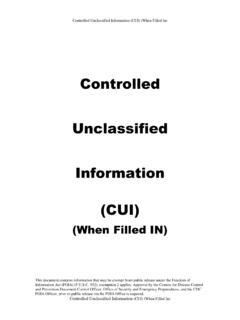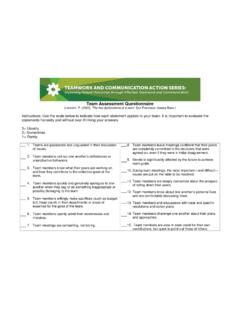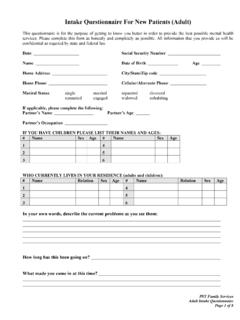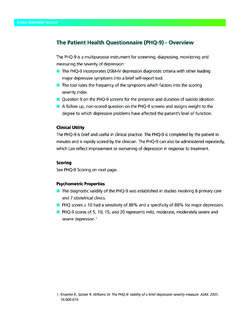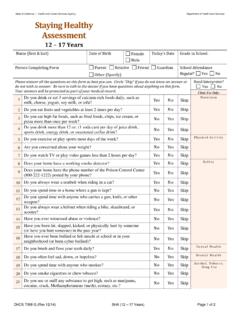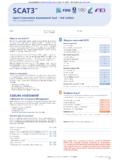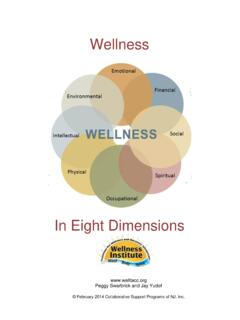Transcription of NEO™ Personality Inventory-3 (NEO™-PI-3)
1 NEO Personality Inventory-3 (NEO -PI-3)Basic Report for BusinessClient InformationResults for:Sam SampleGender:MaleAge:30 Report Date:Sunday, July 17, 2022 Norms:Combined Gender, AdultThe following report is intended to provide information on five basic dimensions of Personality and their corresponding facets. The report is based on research using normal samples and is intended to provide information on the basic dimensions of Personality . The results presented in this report should be integrated with all other sources of information before reaching any professional decisions about this individual. Decisions should never be based solely on the information contained in this report. This report is confidential and intended for use by qualified professionals only; it should not be released to the individual being the following page, you will find T scores and percentile scores for each factor scale.
2 This information is also provided for each facet scale, in addition to the raw score. The remaining pages of the report provide scale descriptions, item responses, and administrative by special permission of the Publisher, Psychological Assessment Resources, Inc.,16204 North Florida Avenue, Lutz, Florida, 2010 by Psychological Assessment Resources, rights reserved. Further reproduction is prohibited without permission from PAR, -PI-3 Basic ReportPage: 2 Report for: Sam SampleReport Date: 7/17/2022 NEO-PI-3 Scale ScoresNorms: Combined Gender, AdultFactor ScalesPercentileScaleT ScorePercentile0102030405060708090100(N) NEUROTICISM7999(E)EXTRAVERSION312(O)OPEN NESS TO EXPERIENCE379(A)AGREEABLENESS5569(C)CONS CIENTIOUSNESS4530 Facet ScalesNeuroticism FacetsPercentileScaleRaw ScoreT ScorePercentile0102030405060708090100(N1 )Anxiety277097(N2)Angry Hostility196186(N3)Depression287799(N4)S elf-Consciousness308399(N5)Impulsiveness 216390(N6)Vulnerability248099 Extraversion FacetsPercentileScaleRaw ScoreT ScorePercentile0102030405060708090100(E1 )Warmth16368(E2)Gregariousness7302(E3)As sertiveness7312(E4)Activity11345(E5)Exci tement-Seeking7302(E6)Positive Emotions8250 Openness to Experience FacetsPercentileScaleRaw ScoreT ScorePercentile0102030405060708090100(O1 )Fantasy10356(O2)Aesthetics144634(O3)Fee lings225465(O4)Actions9312(O5)
3 Ideas8323(O6)Values164015 Agreeableness FacetsPercentileScaleRaw ScoreT ScorePercentile0102030405060708090100(A1 )Trust215361(A2)Straightforwardness16411 8(A3)Altruism204118(A4)Compliance164946( A5)Modesty287097(A6)Tender-Mindedness174 118 Conscientiousness FacetsPercentileScaleRaw ScoreT ScorePercentile0102030405060708090100(C1 )Competence15334(C2)Order154118(C3)Dutif ulness17379(C4)Achievement Striving164221(C5)Self-Discipline164015( C6)Deliberation195257 Copyright 2010 Psychological Assessment Resources, -PI-3 Basic ReportPage: 3 Report for: Sam SampleReport Date: 7/17/2022 NEO-PI-3 Factor Scale Descriptions(N) NEUROTICISMD escription of high scores:Individuals who are high in neuroticism have a tendency to experience negative affects such as fear, sadness, embarrassment, anger, guilt, and disgust.
4 They are also prone to irrational ideas, are less able to control their impulses, and tend to cope poorly with of low scores:Individuals who are low in neuroticism are emotionally stable. They are usually calm, even-tempered, relaxed, and able to face stressful situations without becoming upset or rattled.(E) EXTRAVERSIOND escription of high scores:Individuals who are high in extraversion are sociable; they like people and prefer large groups and gatherings. Extraverts are assertive, active, and talkative. They like excitement and stimulation and tend to be cheerful in disposition. They are upbeat, energetic, and of low scores:Individuals who are low in extraversion are reserved, independent, and even-paced. Introverts prefer to be alone. Although they are not given to the exuberant high spirits of extraverts, introverts are not unhappy or pessimistic.
5 (O) OPENNESS TO EXPERIENCED escription of high scores:Individuals who are high in openness to experience tend to have an active imagination, aesthetic sensitivity, attentiveness to inner feelings, preference for variety, intellectual curiosity, and independence of judgment. Open individuals are curious about both inner and outer worlds, and their lives are experientially richer than those of closed individuals. They are willing to entertain novel ideas and unconventional values, and they experience both positive and negative emotions more keenly than do closed individuals. Open individuals are willing to question authority and are prepared to entertain new ethical, social, and political of low scores:Individuals who score low on openness to experience tend to be conventional in behavior and conservative in outlook.
6 They prefer the familiar to the novel, and their emotional responses are somewhat muted. Individuals with low scores tend to be socially and politically conservative; this is not be mistaken with intolerance or authoritarian aggression.(A) AGREEABLENESSD escription of high scores:Individuals who are high in agreeableness tend to be fundamentally altruistic. They tend to be sympathetic to others and eager to help them, and believe that others will be equally helpful in of low scores:Low scorers are typically disagreeable or antagonistic, egocentric, skeptical of others' intentions, and competitive rather than cooperative.(C) CONSCIENTIOUSNESSD escription of high scores:Individuals who are high in conscientiousness are purposeful, strong-willed, and determined. They are typically involved in planning, organizing, and carrying out tasks.
7 High conscientiousness is associated with academic and occupational achievement. High scorers are scrupulous, punctual, and of low scores:Low scorers are less exacting in applying moral principles, and more lackadaisical in working toward their 2010 Psychological Assessment Resources, -PI-3 Basic ReportPage: 4 Report for: Sam SampleReport Date: 7/17/2022 NEO-PI-3 Facet Scale DescriptionsNeuroticism Facets(N1) AnxietyAnxious individuals are apprehensive, fearful, prone to worry, nervous, tense, and jittery. The scale does not measure specific fears or phobias, but high scorers are more likely to have such fears, as well as free-floating anxiety. Low scorers are calm and relaxed. They do not dwell on things that might go wrong.(N2) Angry HostilityAngry hostility represents the tendency to experience anger and related states such as frustration and bitterness.
8 This scale measures the individual's readiness to experience anger; whether the anger is expressed depends on the individual's level of Agreeableness. Note, however, that disagreeable people often score high on this scale. Low scorers are easy-going and slow to anger.(N3) DepressionThis scale measures individual differences in the tendency to experience depressive affect. High scorers are prone to feelings of guilt, sadness, hopelessness, and loneliness. They are easily discouraged and often dejected. Low scorers rarely experience such emotions, but they are not necessarily cheerful and lighthearted characteristics associated instead with Extraversion.(N4) Self-ConsciousnessThe emotions of shame and embarrassment form the core of this facet of Neuroticism. Self-conscious individuals are uncomfortable around others, sensitive to ridicule, and prone to feelings of inferiority.
9 Self-consciousness is akin to shyness and social anxiety. Low scorers do not necessarily have poise or good social skills, they are simply less disturbed by awkward social situations.(N5) ImpulsivenessImpulsiveness refers to the inability to control cravings and urges. Desires ( , for food, cigarettes, possessions) are perceived as being so strong that the individual cannot resist them, although he or she may later regret the behavior. Low scorers find it easier to resist such temptations and have a high tolerance for frustration. The Impulsiveness facet should not be confused with spontaneity, risk-taking, or rapid decision time.(N6) VulnerabilityIndividuals who score high on this scale feel unable to cope with stress, becoming dependent, hopeless, or panicked when facing emergency situations.
10 Low scorers perceive themselves as capable of handling themselves in difficult Facets(E1) WarmthWarmth is the facet of Extraversion most relevant to issues of interpersonal intimacy. Warm people are affectionate and friendly. They genuinely like people and easily form close attachments to others. Low scorers are neither hostile nor necessarily lacking in compassion, but they are more formal, reserved, and distant in manner than high 2010 Psychological Assessment Resources, -PI-3 Basic ReportPage: 5 Report for: Sam SampleReport Date: 7/17/2022 NEO-PI-3 Facet Scale Descriptions (continued)Extraversion Facets (continued)(E2) GregariousnessGregarious people enjoy the company of others the more the merrier. Low scorers on this scale tend to be loners who do not seek or who even actively avoid social stimulation.
